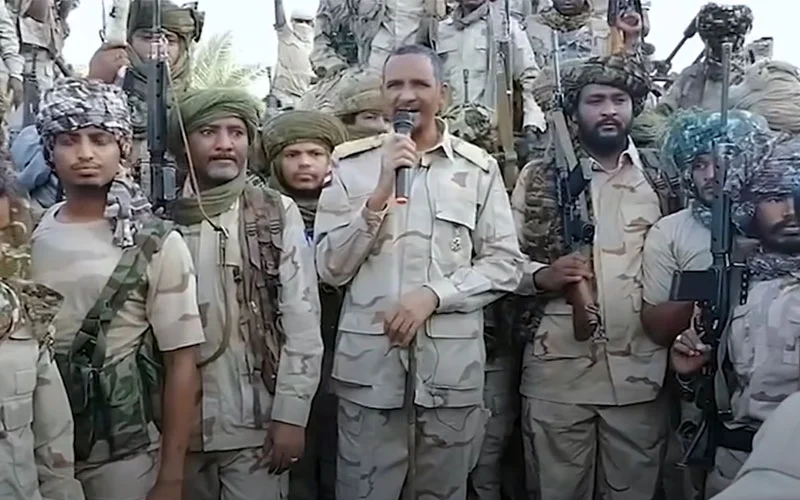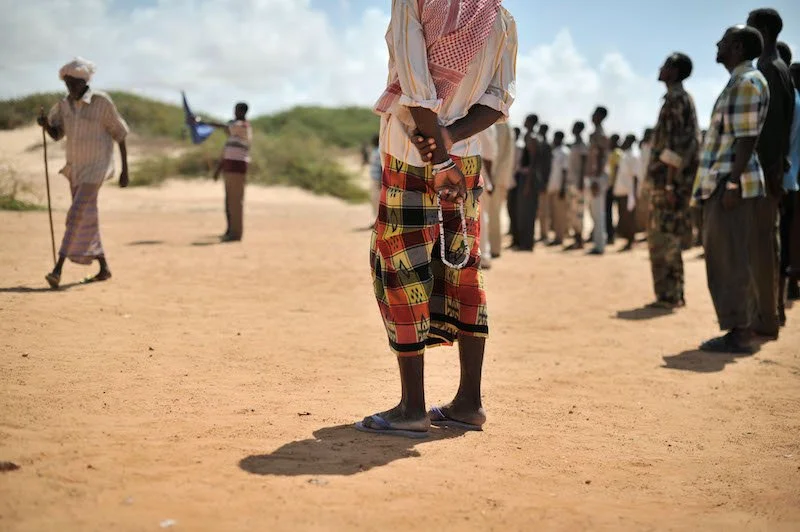After two years of famine, disease and misery, the U.S. has given an official name to the Sudanese people’s suffering: genocide.
People walking in Sudan. CC0
On Jan. 7, 2025, the United States determined that the Sudanese paramilitary group Rapid Support Forces (RSF) and its proxies committed acts of genocide. Over the two-year course of the ongoing Sudanese Civil War, the RSF and their adversaries, the Sudanese Armed Forces (SAF), have devastated the country, killing anywhere from 61,000 to 150,000 people, and displacing more than 11.5 million. However, the U.S. singled out the RSF in what was ultimately the country’s seventh genocide declaration in U.S. history. But although the official label of genocide is new, the deadly violence in Sudan is not.
People displaced by the Sudanese Civil War. Free Malaysia Today. CC BY 4.0
After a series of coups between 2019-2021, the military SAF established itself as Sudan’s official government. At this point, the RSF and SAF were allies, with the paramilitary RSF working alongside Sudan’s official military/the SAF. The SAF overthrew Sudan’s previous governments and installed themselves with the RSF’s help. However, this alliance fell apart after SAF leader General Abdel Fattah al-Burhan and RSF leader Lt. Gen. Mohamad Hamdan (also called Hemedti) disagreed on how to merge their forces. In April 2023, RSF forces conducted surprise airstrikes on SAF sites across Khartoum, Sudan’s capital. Gunfire and violence erupted shortly after in the streets. By December 2023, the RSF and the SAF were at war, with the RSF controlling most of Khartoum as well as the Sudanese regions of Darfur and Jazeera State. As Declan Walsh reported for The New York Times, “A conflict that started as a power struggle between rival generals has metastasized into a far bigger and messier conflagration, threatening to spread chaos across an already fragile region.” Just as Walsh feared, chaos spread.
al-Burhan. Free Malaysia Today. CC BY 4.0.
Hemedti (center) surrounded by RSF soldiers, as posted to the RSF Facebook page. Free Malaysia Today. CC BY 4.0.
The American envoy to Sudan told The New York Times that as of January 2025, the number of people killed by the war “could be as high as 150,000.” Meanwhile, the World Health Organization reported in December 2024 that “nearly 12 million people have been displaced — the largest number in the world — with almost 2.5 million displaced into neighboring countries” such as Egypt, Chad and South Sudan. More than 25 million people are experiencing famine-like conditions, which the World Food Programme calls “the world’s largest hunger crisis.” The Times reports there are “four disease outbreaks — malaria, measles, dengue fever and cholera — that confront the country,” leaving tens of thousands of people ill and in urgent need of health care, according to the United Nations. The U.N. also found that rape, sexual slavery and other acts of sexual violence are rampant as well — and are committed mostly by RSF forces. With the extreme suffering inflicted by RSF invasions and attacks compounding, the U.S. accused the paramilitary group of genocide in January 2025.
Sudanese refugees. Free Malaysia Times. CC BY 4.0.
“The United States does not support either side of this war,” U.S. Secretary of State Antony Blinken said in a statement published January 7, but “the RSF and allied militias have systematically murdered men and boys — even infants — on an ethnic basis, and deliberately targeted women and girls from certain ethnic groups for rape and other forms of brutal sexual violence.” After referencing the RSF’s obstruction of humanitarian aid, Blinken concluded, “Members of the RSF and allied militias have committed genocide in Sudan” along with “crimes against humanity and ethnic cleansing.” However, he again reiterated that “these actions against Hemedti and the RSF do not signify support or favor for the SAF.”
Some experts and Sudanese survivors expect the U.S. to take action to delegitimize the RSF’s public image. But others are critical that the genocide designation is too little too late, believing the U.S. could’ve done more to mitigate — and even prevent — the humanitarian collapse caused by the war, which is already approaching its two-year anniversary. “The Biden Administration waited until it has less than two weeks in office to sanction RSF-affiliated companies and Hemedti for their crimes and to call atrocities in Sudan a genocide,” Republican Senator Jim Risch said. “If the Biden Administration backed its rhetoric with action, Sudan would be in a better position today, more lives would be saved, and the foreign proxies exacerbating this conflict would be kept at bay.”
People gathered in Sudan. CC0
The U.S. defines genocide as “any acts committed with intent to destroy, in whole or in part, a national, ethnical, racial or religious group.” As the U.N. affiliate and nonprofit Better World Campaign put it, “What’s essential [to an American genocide declaration] is evidence that a perpetrator intentionally sought to eliminate a specific group.” In the case of Sudan, the perpetrator is the RSF, while the specific group in question is the Masalit, a non-Arab ethnic group (the RSF is mostly comprised of ethnic Arabs). As for evidence, the U.S. primarily turned to the RSF’s initiation of the war back in April 2023. As they killed, raped and injured thousands during these April attacks, Human Rights Watch found that “RSF fighters and allied militias used derogatory racial slurs against Massalits and [...] told them to leave, that the land was no longer theirs, and that it would be ‘cleaned’ and become ‘the land of the Arabs.’” In July 2023, bodies of dozens of tortured Masalits were found in a mass grave. This ethnic cleansing and its deadly results “became a central element of the American genocide determinations,” U.S. officials told The New York Times. Critics and Sudanese activists alike continue to press the U.S. — and the global community as a whole — to do more for Sudan, but as Better World Campaign writes, “the U.S. declaration is an important step to bringing more attention to the continued violence against the Sudanese people.”
TO GET INVOLVED
Those looking to support civilians affected by the Sudanese Civil War can get involved with humanitarian organizations. Groups such as Save the Children, Doctors Without Borders and the Sudan Humanitarian Fund, a U.N.-controlled relief program, all send supplies such as food, water and medicine to affected communities.
Isabella Liu
Bella is a student at UC Berkeley studying English, Media Studies and Journalism. When she’s not writing or working through the books on her nightstand, you can find her painting her nails red, taking digicam photos with her friends or yelling at the TV to make the Dodgers play better.







